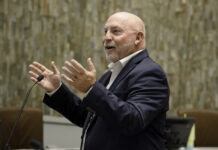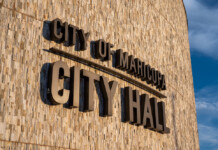Arizona has five propositions on the ballot for the General Election. They range from solar power to education, and most are very divisive. Learn more about the propositions at the InMaricopa.com General Election Town Hall on Saturday.
Prop 125
The Arizona Constitution prohibits diminishing public retirement system benefits. Prop 125 would create an amendment to permit adjusting benefits for retired corrections officers and elected officials as an answer to underfunded pensions. The Legislature already passed Senate Bill 1442 and House Bill 2545 to permit the adjustments; the proposition allows the legislation to go into practice and replace cost-of-living increase with a new, compounding cost-of-living adjustment. The adjustment cannot exceed 2 percent of the base benefit.
For
Public Safety Personnel Retirement System Board of Trustees: “Proposition 125 also will shore up the state’s underfunded Elected Officials’ Retirement Plan and the Corrections Officer Retirement Plan.”
Pinal County Supervisor Anthony Smith: “High pension costs are burdening local taxpayers and crowding out available resources for vital public health, criminal justice and road maintenance responsibilities… These reforms will help rein in costs and protect the taxpayer, while providing a sustainable benefit for existing retirees and a private sector-type defined contribution program for future employees.
Against
Eric Hahn, Tucson: “Corrections officers who are retired fulfilled their employment agreement with their employer and the retirement plan. They should get all the benefits that they were promised and successfully worked for. The Arizona State legislature should not be proposing changes to retiree pensions after the fact. The Corrections Officer Retirement plan is the strongest in Arizona. No changes need to be made except for the Arizona State Legislature to stop raiding all the trust funds and using that money for other areas.”
Prop 126
A proposed constitutional amendment would prohibit the taxation of any service that was not taxed as of Dec. 31, 2017, and prohibit the state, counties and cities or towns from imposing new or increasing existing sales tax or any transaction-based fee.
Backers include Citizens for Fair Tax Policy, Arizona Real Estate.
For
Holly Mabery, chair, Citizens for Fair Tax Policy, Cottonwood: “Sales taxes hit low-and middle-income families hardest. The Protect Arizona Taxpayers Act protects those who are least able to afford new taxes, including senior citizens, the disabled and others on fixed incomes.”
Chad Heinrich, state director, National Federation of Independent Business: “Imagine paying more for childcare services, rent, installations or repairs in your home, or automotive service for your car. These are just a few services provided by small businesses that could someday be taxed if we don’t act to prevent it… This proposition provides certainty and a simple protection for Arizona citizens and businesses against tax-and-spend politicians and bureaucrats who may seek to extract a new tax from us.”
Against
Grand Canyon Institute: “Currently the state foregoes about $12 billion by exempting services from taxation. GCI does not advocate applying sales taxes broadly to services, but Prop. 126 would prevent consideration of possibly taxing select services, say advertising, at even a rate as low as 1 percent.”
Michael Shelton, retired Foreign Service Officer, Tempe: “Our modern economy is becoming a service-based economy. The Arizona Department of Revenue estimates that the value of services sold already exceeds the value of goods sold in this state. If we started a sales tax on some of those transactions, it would be possible to lower the state’s sales tax rate.”
Prop 127
A constitutional amendment would require electric companies (but not government utilities like Salt River Project) to sell increasing amounts of renewable energy by increasing the portion of their retail energy sales generated from renewable energy to 50 percent by 2030.
Backers include Clean Energy for a Healthy Arizona, Natural Resources Defense Council and Conservative Alliance for Solar Energy.
For
David Garcia, governor candidate Phoenix: “The Clean Energy for A Healthy Arizona initiative will position Arizona as the solar superpower it should be by increasing the amount of our energy that comes from renewable sources to 50 percent by 2030.
William Mundell, Paradise Valley, and Sandra Kennedy, Phoenix, former Corporation Commissioners: “APS/Pinnacle West has unethically spent millions of customer dollars to elect and control the Commission. The result has been to fall behind other states in the use of solar energy. Arizona should be the Solar Capital of the world.
Chris Herstam, former president of the Arizona Board of Regents: “By using millions in ratepayer money, APS has established complete control over the very regulatory body established to keep them in check. Perhaps that is why only 6 percent of Arizona’s power comes from solar despite the fact that we are the sunniest state in the country.”
Kris Mayes, former Arizona Corporation Commissioner: “As a Republican former Arizona Corporation Commissioner, I support increasing the amount of renewable energy produced or purchased by our state’s utilities to 50 percent… By utilizing more solar, wind, biomass and landfill gas, Arizona will tap into what is now the cheapest form of energy available – this will reduce rates for utility customers by more than $4 billion.
Against
Cesar Chavez, Arizona House of Representatives, Phoenix: “As a Democrat, I recognize my opposition to this initiative puts me at odds with some of my colleagues. We all share a common goal of cleaner air and increased reliance on renewable energy, but it’s important we do it the right way… This proposal is being forced on our voters by somebody who has no one’s interests in mind but his own.
Bas Aja, executive vice president, Arizona Cattle Feeders’ Association, Phoenix: “Make no mistake: this California-conceived energy initiative is not about improving our air quality or making Arizona a healthier place to live. In fact, study after study has shown that – not only will this proposal do more harm than good for the environment – it will also result in lost jobs, cause irreparable economic damage and hurt hardworking Arizona families and business owners – including the industry men and women we represent.
Victor Riches, president/CEO, Goldwater Institute, Phoenix: “The debate is not whether we should or should not be looking to renewable energy for our state’s future — the issue is with forcing Arizona’s taxpayers to implement a program that is not fiscally sound.”
Vince Leach, State Representative LD 11, SaddleBrooke: “The consequences of complying with these unrealistic mandates would be catastrophic to Arizona – electric bills would skyrocket, tens of millions of dollars in tax revenue would be lost, thousands of jobs would go away.”
Prop 305
This proposition would enact Senate Bill 1431, expanding the eligibility for Education Empowerment Scholarship Accounts for kindergarten through 12th grade and more funding for low-income students for tuition, textbooks, tutoring, educational therapies at a private or home-based school.
Backers include The Bishops of the Arizona Catholic Conference and Arizona Free Enterprise Club.
For
Cathy Parisi, Tucson: “As Arizona’s population continues to grow, the few of us who choose private schools provide a relief for growing school districts, not a drain.”
Matt Simon, former teacher, Tucson: “Prop 305 has strong accountability and transparency requirements to ensure that these dollars are being spent in accordance with the law and on the student. This is more transparency and accountability than exists for the traditional school system.”
Jason Bedrick, Phoenix: “Our public education system should be designed to meet the needs of children, not the other way around. Students are not mere funding units, but individuals with varied aptitudes, interests and preferences. Different children advance in different subjects at difference paces, and some learn better in certain environments than others. ESAs empower families with greater access to a variety of learning options that best meet their child’s unique needs.”
Against
Charles Siler, former external affairs manager, Goldwater Institute, Scottsdale: “While I am a believer in the ESA program, Proposition 305 is not well thought out. They could have written the bill in a much more responsible way that fixed existing flaws in the ESA program and made accessing ESAs more just.”
Susan Collins, Kingman: “Even if money is not taken directly from your local district and charter schools (both publicly funded), money is taken from the education budget on the state level. That effects every public district, charter, school, teacher and student in the state of Arizona.”
Susan Edwards, ESA Family Network, Tempe: “Those in favor of Prop. 305 are exploiting our children to crack open the funding door for private religious education. Our children were paraded around as the justification for a voucher expansion for those seeking a private religious education. ESA benefits will not go away for children with disabilities if Prop. 305 is rejected.”
Prop 306
This change to the Citizens Clean Elections Act would prohibit clean-election candidates from transferring any money from their campaign funds to a political party or other tax-exempt organization that influences elections.
Backers include Stop Taxpayer Money for Political Parties and Americans for Prosperity.
Henry Ritter, Scottsdale: “Of all the problems I have heard people complain about in Arizona, I have never once heard someone say the political parties need more money. That is why it is strange that the Arizona Clean Elections Commission voted to give government money — your money — to political parties so they could afford to send you campaign advertisements and robo-calls.”
Mark Finchem, House of Representatives LD11, Oro Valley: “In 2016, it was discovered that several Clean Election candidates had contributed over $100,000 to the State Democrat Party. This was an obvious abuse of the system and opens up the possibility that both state parties could look to place candidates on the ballot for the sole purpose of providing Clean Election funds to the party. Even more interesting, Clean Elections included language in the rule to permit participating candidates to contribute to 501(C) organizations. The practical effect of this change is that a candidate is now allowed to give money to a nonprofit (for example, a labor union) that could use the money to support and oppose candidates for office. This activity is far afield from the intentions of the voters to fund individual candidates, not political machines.”
Against
Katie Hobbs, Senate minority leader, Phoenix: “Clean Elections is an independent, bipartisan guardian for our elections. Its job is to protect democracy for all of us, not just billionaires and greedy corporations. It’s part of what makes Arizona great – most states don’t have anything like Clean Elections to hold their politicians accountable. Prop 306 would put Clean Elections under the control of a group of political insiders chosen by the governor. That’s a recipe for less transparency in our state government, and more corruption.”
State legislative contingent from LD26: “Arizona’s democracy is in trouble. We see it every day at the state Capitol. Lobbyists for greedy corporations get the special favors they want from a political establishment that benefits from maintaining this unequal status quo. Meanwhile pleas from students, teachers and parents for well-funded schools go unheard, and working-class families struggle to find good-paying jobs in an economy whose rules are rigged in favor of the elite. Prop 306 is their latest trick to undermine Clean Elections. Don’t fall for it. We fought against Prop 306 as the politicians at the state Capitol passed it (literally) in the middle of the night, because you deserve better.”
This story appears in the October issue of InMaricopa.





![Elena Trails releases home renderings An image of one of 56 elevation renderings submitted to Maricopa's planning department for the Elena Trails subdivison. The developer plans to construct 14 different floor plans, with four elevation styles per plan. [City of Maricopa]](https://www.inmaricopa.com/wp-content/uploads/2024/04/city-041724-elena-trails-rendering-218x150.jpg)
![Affordable apartments planned near ‘Restaurant Row’ A blue square highlights the area of the proposed affordable housing development and "Restaurant Row" sitting south of city hall and the Maricopa Police Department. Preliminary architectural drawings were not yet available. [City of Maricopa]](https://www.inmaricopa.com/wp-content/uploads/2024/04/041724-affordable-housing-project-restaurant-row-218x150.jpg)

![City looks to lower property taxes again City Manager Ben Bitter speaks during a Chamber of Commerce event at Global Water Resources on April 11, 2024. Bitter discussed the current state of economic development in Maricopa, as well as hinting at lowering property tax rates again. [Monica D. Spencer]](https://www.inmaricopa.com/wp-content/uploads/2024/04/spencer-041124-ben-bitter-chamber-property-taxes-web-218x150.jpg)



![Alleged car thief released without charges Phoenix police stop a stolen vehicle on April 20, 2024. [Facebook]](https://www.inmaricopa.com/wp-content/uploads/2024/04/IMG_5040-218x150.jpg)




